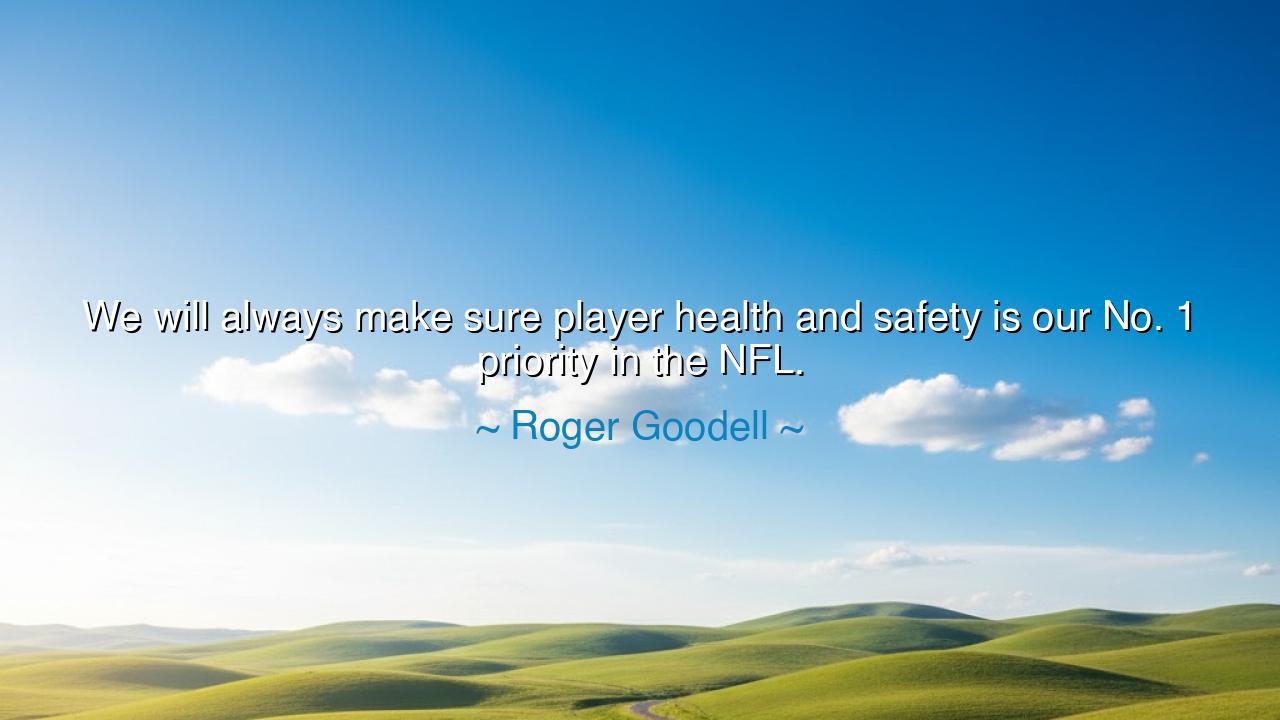
We will always make sure player health and safety is our No. 1






The commissioner Roger Goodell, the guardian of one of the world’s most powerful sports, once declared: “We will always make sure player health and safety is our No. 1 priority in the NFL.” On the surface, these words are a pledge—a statement of duty from a leader to those he governs. But beneath them lies a truth as ancient as the arenas of Rome: that the strength of any contest, the glory of any victory, is meaningless if it comes at the cost of human life. Goodell’s declaration, though born in the age of modern sport, carries the weight of an old wisdom—that power without care, competition without compassion, is but savagery clothed in spectacle.
In the ancient coliseums, the gladiators fought beneath the roaring crowds, their bodies the currency of entertainment. To the people of Rome, the games were grand, but to the fighters, they were survival. The empire, in its pride, valued victory more than humanity, and in time, that pride became its decay. Roger Goodell’s words, spoken in a new age of arenas, stand as a vow against such blindness. He reminds the world that the modern warrior—the football player—is not a tool of amusement, but a human being whose body and mind carry the marks of every battle. In honoring health and safety, he honors the sacred balance between courage and compassion, competition and conscience.
The origin of this quote arises from a time when the National Football League stood at the crossroads of glory and guilt. Reports of concussions, chronic traumatic encephalopathy (CTE), and long-term injuries revealed a painful truth: that the game millions loved was exacting a quiet, devastating cost upon those who played it. Men who had once been cheered as heroes found themselves crippled, their minds clouded, their memories fading. The outcry that followed was not merely about rules or helmets—it was a moral awakening. It was the realization that victory, when bought with suffering, becomes hollow. And so, Goodell’s words became a promise to rebuild trust—to ensure that the love of the game never again outweighs the value of a life.
Consider the story of Mike Webster, one of the greatest centers in NFL history—a man of unyielding strength who anchored the Pittsburgh Steelers’ offensive line through four Super Bowl victories. But after retirement, Webster’s body began to fail, and his mind began to slip. Years of repeated head trauma had left scars that no one could see. His tragedy, and those that followed, became the spark for reform, forcing the league to confront its own shadows. In this way, Goodell’s pledge is not a boast but a response to history—a recognition that greatness demands responsibility, and that every leader must face the consequences of his domain.
There is heroism in sacrifice, yes—but the wise know that true heroism lies not in needless pain, but in the preservation of purpose. The ancients spoke of the warrior’s code, a sacred promise that those who fight shall be protected by those they serve. When a commander leads his army, he must care for their well-being, for their strength is the foundation of his glory. So too, in modern sport, the commissioner must be both ruler and guardian, ensuring that the athletes who give their bodies to the game are not abandoned to its wounds. To protect the player is to protect the spirit of the game itself.
In Goodell’s declaration, there is also a lesson for all who lead—whether in sport, in work, or in life. Leadership is not measured by the grandeur of victory, but by the compassion with which one guards the lives in their charge. To make health and safety the “No. 1 priority” is to acknowledge that strength without protection becomes destruction. It is to say that excellence must walk hand in hand with empathy. The wise leader sees his followers not as instruments of success, but as souls of infinite worth.
Let this truth echo beyond the stadiums and locker rooms: no goal is worth the loss of humanity. Every community, every institution, must remember that its greatest wealth lies in the well-being of its people. To pursue triumph at the cost of life is to betray the very meaning of triumph itself. Whether on the field, in the workplace, or within the heart, we must hold fast to the principle that care is not weakness—it is wisdom.
Thus, Roger Goodell’s words, spoken to the world of sport, carry the resonance of a timeless law: that those who create the contest must also preserve the competitor. Let all who hear them remember this—greatness is not in how hard one fights, but in how well one safeguards the fighter. For in the end, victory fades, trophies tarnish, and applause falls silent, but the dignity of the human being endures. And to protect that dignity, above all else, is the highest calling of any age.






AAdministratorAdministrator
Welcome, honored guests. Please leave a comment, we will respond soon